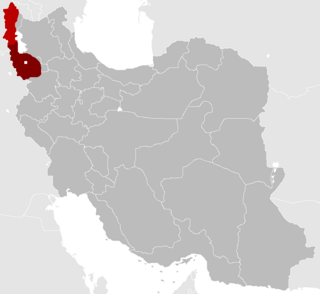
The United Nations General Assembly, UNGA; French: Assemblée générale des Nations unies, AGDNU is one of the six principal organs of the United Nations (UN), serving as its main deliberative, policymaking, and representative organ. Currently in its 79th session, its powers, composition, functions, and procedures are set out in Chapter IV of the United Nations Charter.
A United Nations General Assembly resolution is a decision or declaration voted on by all member states of the United Nations in the General Assembly.
The United Nations General Assembly has granted observer status to international organizations, entities, and non-member states, to enable them to participate in the work of the United Nations General Assembly, though with limitations. The General Assembly determines the privileges it will grant to each observer, beyond those laid down in a 1986 Conference on treaties between states and international organizations. Exceptionally, the European Union (EU) was in 2011 granted the right to speak in debates, to submit proposals and amendments, the right of reply, to raise points of order and to circulate documents, etc. As of May 2011, the EU is the only international organization to hold these enhanced rights, which has been likened to the rights of full membership, short of the right to vote.

United Nations Security Council Resolution 3 was adopted on 4 April 1946. The Council acknowledged that Soviet troops occupying Iran were not removed in accordance with the Tri-partite Treaty of 29 January. Further proceedings surrounding the Iranian crisis were deferred until 6 May, when Soviet withdrawal was to be complete.
United Nations Security Council Resolution 67, adopted on January 28, 1949, satisfied that both parties in the Indonesian Conflict continued to adhere to the principles of the Renville Agreement, the Council called upon the Netherlands to immediately discontinue all military operations and upon the Indonesian Republic to order its armed adherents to cease guerrilla warfare and for both parties to cooperate in the restoration of peace and the maintenance of law and order throughout the area. The Council further called upon the Netherlands to release all political prisoners arrested since December 17, 1948 and to facilitate the immediate return of officials of the Government of the Republic of Indonesia to Jogjakarta and afford to them such facilities as may reasonably be required by that Government for its effective functioning in that area.
United Nations Security Council Resolution 157 was adopted on 17 September 1960. After a discussion of the Congo Crisis led to a lack of unanimity among the Security Council's permanent members and thus prevented it from exercising its primary responsibility for the maintenance of international peace and security, the Council decided to call an emergency special session of the General Assembly to make appropriate recommendations.
United Nations Security Council Resolution 202, adopted on May 6, 1965, after reaffirming motions from the General Assembly, the Council requested that no member state accept a Unilateral Declaration of Independence from Southern Rhodesia and that the United Kingdom take all measures necessary to prevent it. The resolution also called on all political prisoners to be released and for the freedom of political parties to operate. The Council requested that the UK work toward and equitable constitution and for the future independence of a majority-ruled Southern Rhodesia.

United Nations Security Council Resolution 203, adopted on May 14, 1965, in the face of growing instability, a developing civil war and the probability of foreign intervention in the Dominican Republic, the Council called for a strict cease-fire and invited the Secretary-General to send a representative to the Dominican Republic to report to the council on the present situation.

United Nations Security Council Resolution 208, adopted on August 10, 1965, after noting with regret the death of Judge Abdel Hamid Badawi, a judge on the International Court of Justice, the Council decided that the election to fill the vacancy would take place during the twentieth session of the General Assembly.

United Nations Security Council Resolution 209, adopted on September 4, 1965, with a deteriorating situation along the cease-fire line in Kashmir, the Council called upon both India and Pakistan to take all steps necessary to immediately cease fighting and return to their respective sides of the line. The Council also called on the two governments to co-operate fully with the United Nations Military Observer Group in Pakistan and asked the Secretary-General to report back on the implementation of the resolution within three days.

United Nations Security Council Resolution 210, adopted unanimously on September 6, 1965, after receiving a report by the Secretary-General on the developments in the situation in Kashmir, the Council called on the parties to cease hostilities in the entire area of conflict immediately and withdraw all armed personnel to the positions they held before August 5, 1965. The Council requested the Secretary General do all he possibly could to give effect to the present resolution and resolution 209 as well as strengthening the United Nations Military Observer Group in Pakistan. The Council then decided to keep the issue under urgent and continuous review.
United Nations Security Council Resolution 213 was adopted unanimously on September 20, 1965. It was done after examining the application of Singapore for membership in the United Nations. The Council recommended to the General Assembly that Singapore be admitted.

United Nations Security Council Resolution 1982, adopted unanimously on May 17, 2011, after recalling all previous resolutions on the situation in Sudan, the Council extended the mandate of an expert panel monitoring the arms embargo and other sanctions against the country until February 19, 2012.

United Nations Security Council Resolution 2166, concerning the shootdown of Malaysia Airlines Flight 17, was sponsored by Australia and adopted unanimously on 21 July 2014. The resolution expressed support for the "efforts to establish a full, thorough and independent international investigation into the incident in accordance with international civil aviation guidelines" and called on all United Nations member states "to provide any requested assistance to civil and criminal investigations".

The eleventh emergency special session of the United Nations General Assembly opened on 28 February 2022 at the United Nations headquarters. It addresses the Russian invasion of Ukraine. Maldivian politician Abdulla Shahid served as President of the body during this time.

United Nations General Assembly Resolution ES‑11/2 is the second resolution of the eleventh emergency special session of the United Nations General Assembly, adopted on 24 March 2022, following Resolution ES-11/1 which was adopted on 2 March 2022. Resolution ES‑11/2 reaffirmed the UN's former commitments and obligations under its Charter, and reiterated its demand that Russia withdraw from Ukraine's recognized sovereign territory; it also deplored, expressed grave concern over and condemned attacks on civilian populations and infrastructure. Fourteen principles were agreed.

United Nations General Assembly Resolution ES‑11/3 is a resolution of the eleventh emergency special session of the United Nations General Assembly, adopted on 7 April 2022. The resolution suspended the membership of Russia in the United Nations Human Rights Council over "grave concern at the ongoing human rights and humanitarian crisis in Ukraine [...] including gross and systematic violations and abuses of human rights" committed by Russia, and was passed with 93 votes in favour, 24 against, and 58 abstentions.

United Nations General Assembly Resolution ES‑11/4 is the fourth resolution of the eleventh emergency special session of the United Nations General Assembly, adopted on 12 October 2022, following Resolution ES-11/3 which was adopted on 7 April 2022.

United Nations Security Council resolutions are United Nations resolutions adopted by the fifteen members of the Security Council (UNSC); the United Nations (UN) body charged with "primary responsibility for the maintenance of international peace and security".












